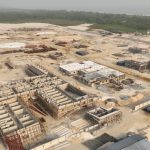Green Energy International Limited (GEIL) has completed its $400 million Otakikpo Terminal in Rivers State, marking a major milestone in Nigeria’s oil and gas industry and ending the country’s 50-year reliance on export infrastructure built exclusively by multinational companies.
Chairman of GEIL, Professor Anthony Adegbulugbe, described the facility as “a project whose time has come”, noting that it is the first fully indigenous onshore crude oil terminal built and operated by Nigerians. President Bola Tinubu is expected to officially inaugurate the facility soon.
A Game-Changer for Oil Exports
The Otakikpo Terminal, completed in less than two years, features an initial storage capacity of 750,000 barrels, expandable to 3 million barrels, with a 360,000 barrels per day pumping capacity for loading export tankers. It is also designed to handle up to 250,000 barrels per day of crude injection, creating new export opportunities for producers.
Until now, Nigeria relied on five large onshore crude terminals — Bonny, Qua Iboe, Brass, Forcados, and Escravos — all built more than 50 years ago by international oil companies. Together, they account for about half of Nigeria’s crude oil exports.
“The Otakikpo Terminal will change the narrative. For the first time, Nigerians have built their own oil export infrastructure, reducing over-dependence on ageing facilities operated by multinationals,” Prof. Adegbulugbe said.
Designed for Multiple Investors
According to Adegbulugbe, the terminal offers solutions for four categories of exploration and production companies:
- Small reserve holders who can truck 1,000–1,500 barrels to the terminal.
- Creek operators who can move oil via barges to an offshore point (km 6) connected to the terminal.
- Offshore producers within 20–23 km who can use GEIL’s bi-directional pipeline to pump crude onshore.
- Larger operators within 40 km seeking secure evacuation to mitigate theft and losses.
“All pipelines coming to us are designed to be three-phase — oil, water, and gas. With gas in the line, vandalisation risks are reduced. Producers can now be assured of receiving full value for their output,” he explained.
Strategic Impact
The terminal is expected to:
- Provide evacuation solutions for over 40 stranded fields in the Niger Delta, estimated to hold 3 billion barrels of oil equivalent (BOE).
- Support the government’s push to revitalize Ogoni and Opobo fields, dormant for more than three decades.
- Attract new investment, with GEIL projecting total development costs of $1.3 billion over multiple phases.
By offering cost-effective access to export routes, the facility reduces bottlenecks and boosts Nigeria’s production potential at a time when ageing infrastructure has constrained output.
Indigenous Leadership in Energy Infrastructure
With the Otakikpo project, GEIL has made history as the first African operator to independently develop a crude oil export terminal.
“This terminal is a multipurpose solution — reducing losses, providing security, and opening new investment opportunities. It demonstrates that Nigerians can build world-class energy infrastructure,” Adegbulugbe said.
As Nigeria seeks to modernize its oil and gas infrastructure, the Otakikpo Terminal stands out as a reference point for indigenous innovation, positioning the country for sustainable growth and global competitiveness in energy markets.










